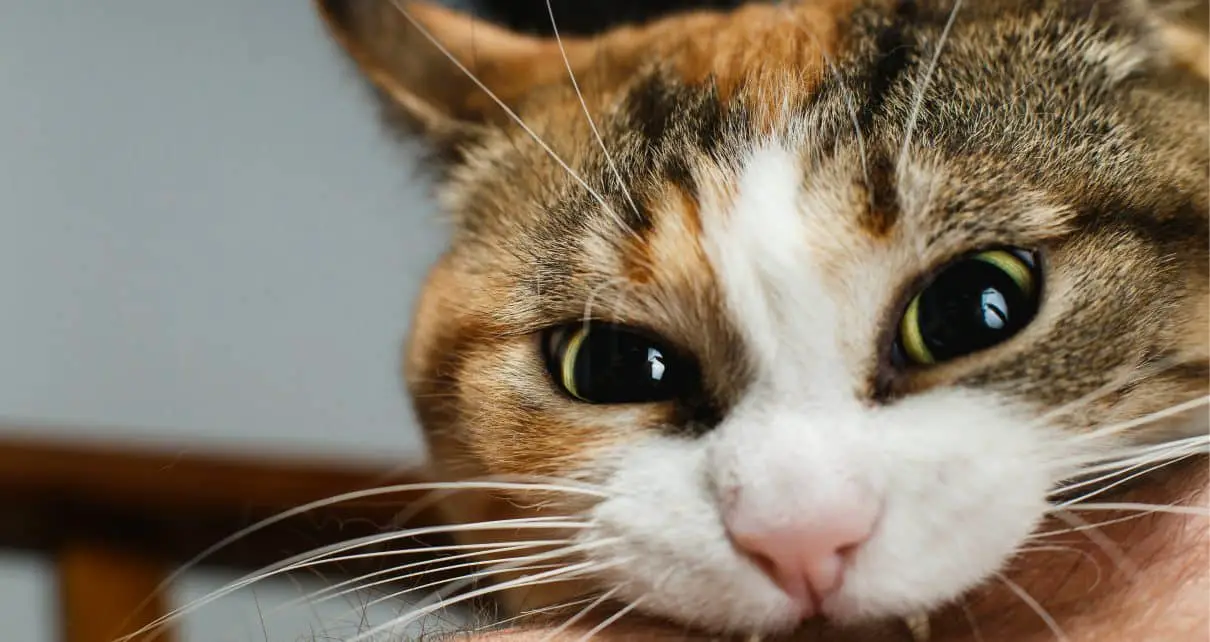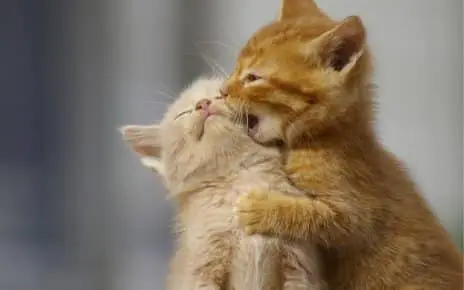Everything seems to be going well. You and your cat are having a wonderful play session and then out of nowhere, you feel teeth. It all happened so quickly and now your cat has left you wondering what happened. You’re not alone. The reason for the cat bite can range from a show of affection that many cat lovers refer to as “love bites” to less innocent reasons – often termed “petting-induced aggression” by feline behaviorists.
Introduction: Why does my cat bite me
The best way to decipher the reason behind why your cat bites are to look for behaviors that accompany the biting. If you’ve been bitten, it is most likely related to one of these five reasons. Here’s our guide to why cats bite and how to avoid them.
Teething
With kittens, biting is expected as they go through the teething phase. This is also the phase where your cat starts to learn what is appropriate during play. Although biting at this age is expected, corrective actions should be taken so that your cat will learn not to use their teeth as an adult. Preferably before those sharp little kitten teeth become adult teeth.
Teething toys may help ease your kitten’s discomfort, particularly if they love to chew. These toys can be found at most pet shops and are usually made from rubber or soft plastic. These types of toys are ideal for your kitten to chew on as they don’t damage their teeth or break up.

When your kitten bites, a loud OW may be an instinctual reaction but try to avoid yelling. Yelling may frighten your cat and make her more likely to bite you again. Instead, leave your cat and give them space for a few minutes. This gives them a chance to calm down. Do this each time they bite. After several times, your cat will begin to understand that biting is what is causing you to stop playing with them.
If this doesn’t work, another method you can try is a squirt bottle. Leave a few squirt bottles filled with water around the house. Just pick one up and give them a small squirt or two. They won’t like it and will quickly get them to stop biting.
You have run out of cat minutes

Most cats often have a time limit before they are done with the current activity and ready to move on. The time limit varies by the cat. While some cats give subtle hints that time is running out, your cat may not. Resulting in a confusing bite that signals, “I’m done”.
Your cat feels stressed
Be sure to recognize the signs that your cat may be stressed or afraid. A cat who is afraid will puff up her fur to make herself look bigger, hiss, howl, growl, swish her tail back and forth, or thump it against the ground, flatten her ears against her head and/or stare at whatever is making her nervous or tense. Situations such as new visitors to your home, building work, neighboring pets or the presence of a new resident pet might all lead your cat to feel stressed.
You should primarily create an environment that removes as much stress as possible. An ideal environment will include places where your cat can hide when she’s been overstimulated and needs a safe place to calm down. Many cats love hiding in cardboard boxes and they are great places to sleep too. Place their favorite blanket in the box for comfort, and make it more appealing by taping the box closed and making a cat-sized hole in the side. This will make your cat feel more comfortable because they can keep an eye on the opening without the worry of being ambushed from behind.
My cat likes to sack out under the bed when there’s a rainstorm outside, for instance, or you may notice that your cat likes to hide? in boxes or paper grocery sacks. Cats are also natural climbers and you probably don’t want yours on the kitchen counters, so be sure to provide vertical structures like a cat tower with some play elements for your cat to climb and entertain herself with while getting the alone time she needs.
Your cat thinks it’s fun
They’re not trying to be mean but they are having fun at your expense. Without proper playtime and exercise, your indoor cat may have some pent up energy and biting your toes and ankles is fun. Especially if they are moving. To avoid your cat from gnawing on you when they are bored, grab their favorite cat toy. Some cats enjoy laser pointers, fishing toys, or feathers. It’s important to find a toy that your cat enjoys. Make sure your cat gets at least half an hour of play each day.

Your cat isn’t feeling well
If your normally calm and sweet-tempered cat has suddenly started exhibiting aggressive behavior that includes biting and you’re positive that nothing has changed in her environment, this may be a sign that she is trying to cover up an injury or illness.
Most animals will try not to exhibit any signs of weakness, including injuries, because other animals may try to take advantage of that weakness. In that case, a trip to the vet may be in order. Your vet will be able to examine and test your cat and find out for certain what is ailing your kitty. You should be especially vigilant when it comes to elderly cats.
If a bite does occur
You’ve been bitten, now what? Don’t worry. If the bite didn’t break skin there is no action needed. Learning to recognize the signs that a bite is coming is important. Your cat may look like they are about to pounce.
However, if your cat went ballistic in pure panic and now you’re bleeding or you were bitten by a cat you don’t know, you’ll want to get the injury treated right away. The sharpness of cat teeth can cause a deep puncture wound that allows bacteria to transfer into skin and joints. Make sure to treat any bites that break the skin as cat bites that break the skin have a high risk of infection.
So the first thing you want to do is prevent infection. Immediately after a cat bite you should…
Clean the wound thoroughly and rinse it with cold water to get rid of the saliva, which can contain several bacteria that can infect the wound. Let it air dry.
Apply a topical antibiotic like hydrogen peroxide or iodine scrub and apply a Band-Aid to keep it from getting dirty. Make sure you apply an antibiotic cream regularly as the cut heals because cat bites can be nasty if they infect.
If it was a deep bite, the bite won’t stop bleeding, or the cat bite is on your face or a joint, it may have damaged tissues under the skin. In this case, go to the doctor right away to have it checked out. The doctor may need to close the wound, remove any dead tissue to prevent infection, or take an X-ray to assess the damage. In minor cases, your doctor will usually prescribe an antibiotic. In the rare case that the damage is severe or might leave a scar, your doctor may recommend reconstructive surgery.
The best way to prevent infection from a cat bite is to keep up with your cat’s immunization schedule. Be sure that the cat is up to date on its immunizations. If it’s not your cat, ask. If it’s a stray or unvaccinated consult with your primary care provider. You should also consult a doctor if you feel feverish after a cat bite, you notice any pus or a foul odor around the wound, or you notice signs of gangrene because these are severe cat bite infection symptoms. You may need a rabies shot just in case.
When your cat bites, they may not understand that they are being naughty. They may just want to play or be stressed or scared about something. The important thing is to remember the reasons that cats bite, know how to correct the behavior, and know what to do if you are injured from a cat bite.




I love this website a lot.